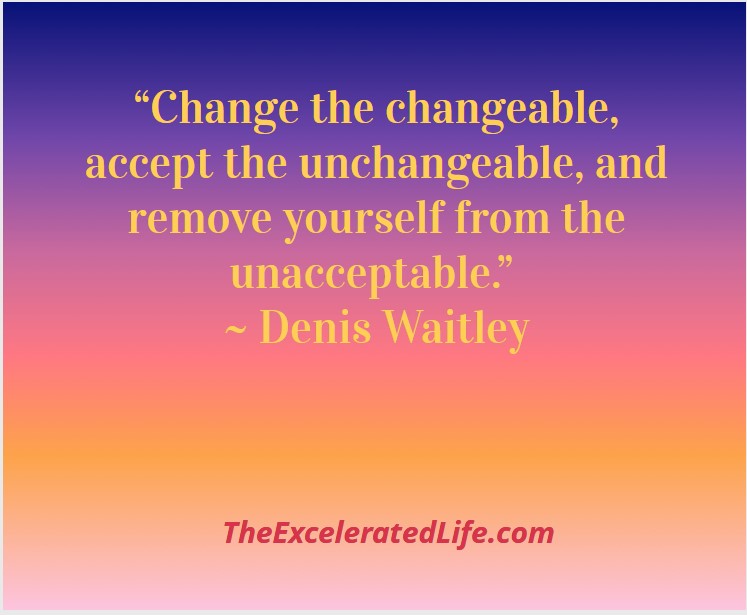Sometimes, as the saying goes, “bad things happen to good people”. Sometimes bad things happen to bad people, too. And sometimes, good things happen to good and bad people. The reality is, things happen to people – good or bad are mostly judgment calls. Accepting where you are in life means you don’t argue with reality. It’s the first step to change what you can.
TheExceleratedLife.com

How To Lose – 100% Of The Time
I once read a Dear Abby letter from a woman who still carried a hurt from something her husband said or did twenty years ago. Twenty years. Can you imagine carrying that thought of “if only . . .” for twenty years? “If only he hadn’t done that.” I don’t remember what Dear Abby said, but here’s my take on it. Get over it. You’re fighting against reality. And as Byron Katie says: “When you argue with reality, you lose — but only 100% of the time.” [Katie]
Your spouse said a hurtful thing? You can wish he or she hadn’t said it. You can argue with reality. Or you can accept it and move on.
You did something you now regret? You can wish you didn’t do it; you can argue with reality. Or you can accept it and move on.
Or how about the big one: the COVID pandemic? You can deny it. You can wish we didn’t have to deal with it. You can argue with reality. Or you can accept it and get on with life (albeit it a different life for the time being).
Change = A Time To Learn
Sometimes we seek change, but often we have change forced upon us — a death, a divorce, the loss of a job, suffering a major illness. We can’t control what happens to us, but we do have the final decision: “How am I going to deal with this change?”
You start by accepting where you are in life right now.
Being impatient to get back to “normal” prevents you from learning the life lessons embedded in the changed circumstance. Denying it, arguing with it, does not help. Changes are the result of cause and effect. It doesn’t matter if you agree with the effect. It doesn’t matter if you like the effect. This is the reality; this is what you need to accept in order to properly deal with the change and learn the lesson.
Change is a process. Growth is a process. That is reality. And it does no good to fight against reality.
What Acceptance Isn’t
Accepting where you are in life doesn’t mean you necessarily condone or approve of the new circumstances. It doesn’t mean you can’t try to change them. And it certainly doesn’t mean you’ve failed. In an article from the Psychology Today blog, Nancy Colier busts the myths we sometimes believe about acceptance.
“We’re OK with what’s happening. We can agree with it.” [Colier]
False. You don’t have to be “OK” with the thing you accept. Accepting doesn’t mean we now want what we do not want. We don’t have to feel good about it or agree with it.
“Acceptance means we stop trying to change it.” [Colier]
False. By accepting a situation, we’re not giving up on having a different reality come to pass. “Acceptance,” writes Collier, “is all about now and has nothing to do with the future.” [Colier] In fact, acceptance is the first step in our efforts to change the situation.
“Acceptance is failure.” [Colier]
False. Acceptance takes courage. Courage to face reality. Courage to examine the facts and learn the lesson – the “seed of benefit” – that is contained in the situation. When living the Excelerated Life™, we don’t win or lose. We win or learn.
What You Can Control
For now, let’s forget the word acceptance and the connotations it carries. Instead, let go, even for a few moments, of the fear, anger, disappointment, or despair and see this as reality, Say, “Yeah, this is happening.” Simply acknowledge reality.
Instead of fighting with the facts, put that energy into doing what you can do. Remember, there are things we can control and there are things outside of our direct control. You and I have some control and ability to influence some causes, but we don’t control the effects, the outcomes. However, the one thing over which we always have complete control is our response to life’s circumstances.
You cannot control other people’s actions. You can’t control nature. Or the weather. You cannot control world or national events. But you can control your response. You can control the meaning you give to events. You can control if you learn the lessons or not.
Focus on those things.
How To Accept
“Man is responsible for his problems because he creates them through his thoughts. Nothing outside you has meaning save for the meaning you give it. Your brain assigns meaning to life’s events to make sense of what takes place.” [Fahkry]
Accepting where you are in life can seem daunting when you are facing a major challenge. Heck, it can be problematic just dealing with the day-to-day disappointments. But like most things, you can begin to implement change by taking small steps in the right direction. If you are ready to stop arguing with reality, here are some small steps you can begin today.
(Please NOTE: I am neither a medical professional nor a licensed counselor. If you are struggling and simply cannot accept or move past a situation you are dealing with, I urge you to seek the assistance of a qualified professional.)
- Go easy on yourself. If you’ve done or said something you find “unacceptable”, stop beating yourself up. Now. If you’re going to grow and become a better you, you must step out of the past. Forgive yourself and let it go. It happened. Stop arguing with reality. Let who you were become the stepping stone for who you are becoming. [Martinez] [K]
- Take the long view. If you focus on the thing you are struggling to accept, it can fill up your whole view. Step back and look at it from the 30,000-foot level and see it in relation to your life as a whole. Or to history as a whole. Nothing lasts forever. Not even a pandemic. Nor you or I. [Martinez]
- Be grateful for what you do have. Expressing gratitude helps us realize how much we already have, even when it seems things are falling down around us. [Martinez] [K]
- Take one day at a time. Even when you take the long view, don’t be overwhelmed. You can only deal with today, today. [Martinez] “Therefore do not worry about tomorrow, for tomorrow will worry about itself. Each day has enough trouble of its own.” ~ Matthew 6:34 (NIV)
- Be here now. Stop. Focus on your breath. Breathe in through your nose into your belly for a count of 6. Hold for a count of 2. Breathe out through your nose for a count of 8. Repeat.
I Wonder If . . .?
The main point about acceptance? It lets you get on with your life.
Psychotherapist David Richo writes in The Five Things We Cannot Change: And the Happiness We Find by Embracing Them: “We can learn to accept life on its own terms. We can even find its terms satisfactory. We do not have to shake our fist at heaven. We do not have to demand an exemption or take refuge in a belief system that muffles the wallop of the givens by promising a paradise without them. We can craft a sane and authentic life by saying yes to life just as it is. Indeed, our path is ‘what is.’” [Richo]
In the book, Wait, What?, author James E. Ryan covers what he terms the five essential life questions. The second essential question is “I wonder . . .?” Ryan tells us that there are two variations of this question: “I wonder why?” and “I wonder if?” These questions open the door to thinking about how you might improve your corner of the world. [Ryan]
Once you accept the reality of what is, this question can get you moving to possibly change the situation . . . keeping in mind that there are some things we can’t change and we must accept that, too.
“Once you start asking ‘I wonder why?’ and especially if you get an unsatisfying answer,” writes Ryan, “you are inevitably going to ask ‘I wonder if things could be different?’ Put another way, to ask ‘I wonder why?’ about the present naturally raises the question ‘I wonder if?’ about the future.” [Ryan]
Accepting where you are in life means accepting that there are some things you can change and some that you cannot. In either case, the first step is to accept what is. The next step is to ask the question “I wonder if things could be different?” and seek an answer. That is embracing the Excelerated Life™!
Excelerated Acceptance™ – identifying and accepting the things you are struggling with — is one step in creating your Excelerated Life™, a life of flourishing and well-being, and a life of meaning, purpose, and service.
Find out more about the Excelerated Life™.
Resources:
Colier LCSW, Rev., Nancy. “Accepting a Reality That Feels Unacceptable.” Psychology Today. Sussex Publishers, LLC, February 27, 2019. Web. January 3, 2021.
https://www.psychologytoday.com/us/blog/inviting-monkey-tea/201902/accepting-reality-feels-unacceptable
Fahkry, Tony. “If You Want To Be Happy, Accept Life As It Is And Let Go Of What You Cannot Control.” Mission.org. A Medium Corporation, October 27, 2017. Web. January 3, 2021.
https://medium.com/the-mission/if-you-want-to-be-happy-accept-life-as-it-is-and-let-go-of-what-you-cannot-control-466ac638a45b
K, Lidiya. “Why Accepting Is The Answer to Most of Your Life’s Problems.” Let’s Reach Success. Let’s Reach Success, June 6, 2016. Web. January 3, 2021.
https://letsreachsuccess.com/2016/06/06/accepting-acceptance-quotes/
Katie, Byron. “The Work Of Byron Katie.” PDF file.
http://thework.com/wp-content/uploads/2019/02/English_LB.pdf
Martinez, M.A., Debbie. “Accepting Where You Are.” HuffPost. Verizon Media, April 1, 2014. Web. January 3, 2021.
https://www.huffpost.com/entry/accepting-where-you-are_b_4689122?guccounter=1&guce_referrer=aHR0cHM6Ly93d3cuZ29vZ2xlLmNvbS8&guce_referrer_sig=AQAAAFmCuXcFgAggJbknty6zWHFO1hgNO0duE2TOmTS7EnM8B6WYUi8CDty4kK62DKgMz_ou27w1r3DiLd16C4biSEbWI12SDVbQQYxAgOEbHoFbvgiOVraNlJ1UJufS2L0Q5BZC1BSCVxPzpQmhsGJFzQL-VcU0S5lB9IAAKWfwbN5e
Richo, David. The Five Things We Cannot Change. Boston, MA: Shambhala Publications, Inc., 2005.
Ryan, James E. Wait, What? And Life’s Other Essential Questions. New York: HarperCollins Publishers Inc., 2017.


